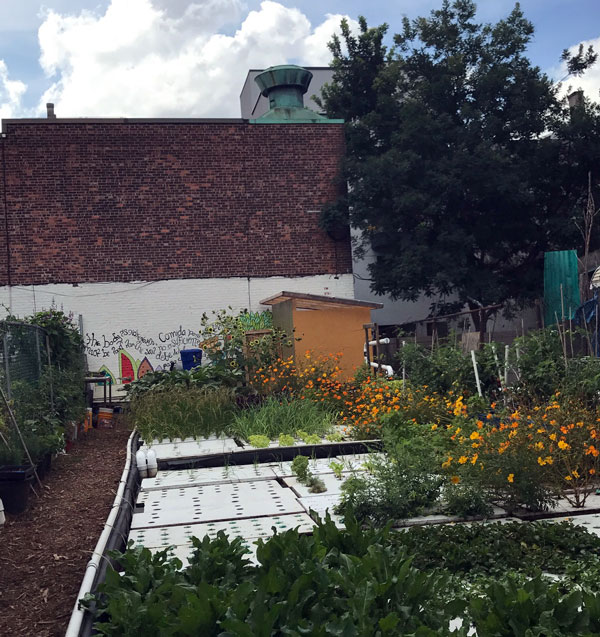How This Urban Farmer Used a Rooftop Garden to Recover From Her Eating Disorder
Yemi Amu’s smiling face greeted us as we walked through the gates of Oko Farms, an aquaponics farm in Bushwick, Brooklyn, located on a nondescript city block nestled between a smoke shop and liquor store. Aquaponics is a productive symbiotic growing system that raises fish and plants in a circulatory manner. It takes the wastewater the fish are raised in, which would normally be thrown out, and utilizes it as nutrients for the plants, purifying the water and feeding it back to the fish.
The existence of Oko Farms, established in 2013 and now the largest outdoor aquaponics farm in New York City, is a product of Yemi’s incredible journey. Raised by a single mother in Nigeria, she moved to the United States at the tender age of 16 with her father.
She dealt with the difficulties of that transition in the only way she knew how: an eating disorder that accompanied her for the better part of her teenage years and early twenties. Her obsession with food and dieting was a way to deal with the ubiquity of junk food, which was a shocking contrast to Nigeria. There, eating ice cream was reserved for special occasions. In the U.S., it could be done at any time.
At age twenty-two, deep in the cycle of bulimia, a burst eye vessel and massive headaches caused Yemi to finally seek help. While her stint in psychotherapy was short-lived, she embarked on her own - albeit less traditional - path towards healing. At the time, she was doing a masters in health and nutrition behavior modification and working at a housing facility for formerly homeless and mentally ill adults. There she saw the theories of change she learned in academia being put into practice.
Applying what she had learned to her own life was the next step. It was the first time in her life where she learned that food could heal, and it allowed her to shift her obsession and the self-hatred that had fueled her eating disorder into something more positive. While the change wasn't instant, Yemi was armed with her newfound knowledge as well as the community of supportive and positive people surrounding her. She gradually saw food as a friend instead of an enemy to be beaten.
At the same time, Yemi started a rooftop garden for her nutritional clients. She had no idea what she was getting into, despite studying agriculture back in Nigeria. Making many mistakes along the way, she continued to read and learn everything she could. The tides turned when she was applying for and receiving a grant for her work. She realized then that this is what she needed to be doing with her life.
Yemi was propelled by the idea that her farm's success could prove that urban farming was not just for trendy hipsters, but could be a powerful catalyst for people of color and communities at risk. The act of growing one's own food in underutilized urban spaces was about food security and food justice. It could be a practical way of earning a sustainable income through working with the land and taking control of a societal narrative that marginalizes and divides.
Yemi's role at Oko Farms has transitioned into that of a teacher and role model. By taking on the responsibility of teaching people how to grow food, she pays tribute to the ways in which farming and growing her own food transformed her life. She grows food because it's her ongoing therapy, her way of making a difference in the world. Yemi knows that through her success, she's paving the way for other people like her to become entrepreneurs and farmers. Most importantly, it's a way to cultivate a positive relationship with food and themselves.
Oko Farms, just like Yemi’s inextinguishable hope and enthusiasm, is bursting with growth in a place that would have otherwise succumbed to urban sprawl. Oko Farms is a a testament to Yemi's spirit and the way in which she transformed her own personal struggle into a way to make the world just a little bit better.
Love,
Leigh Ofer for The BeeHive





